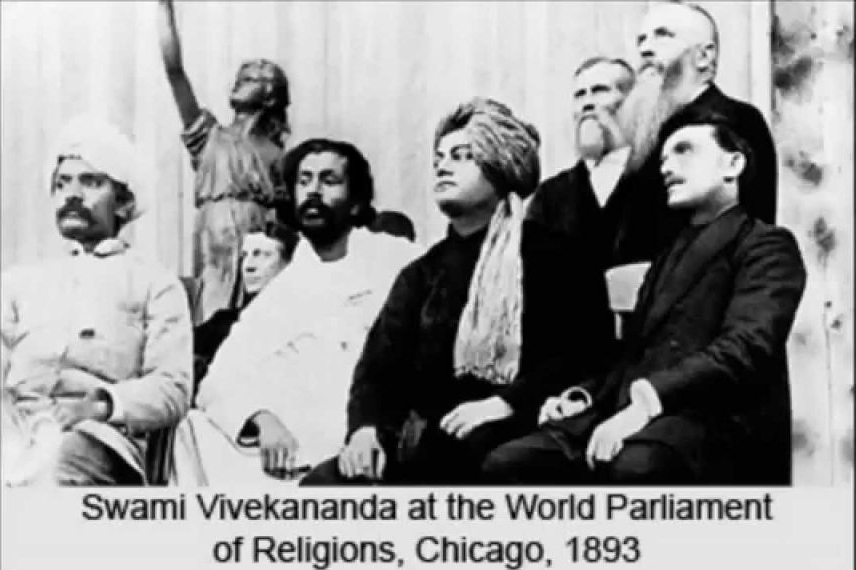“The present convention, which is one of the most august assemblies ever held, is in itself a vindication, a declaration to the world of the wonderful doctrine preached in the Gita: “Whosoever comes to Me, through whatsoever form, I reach him; all men are struggling through paths which in the end lead to me.” Sectarianism, bigotry, and its horrible descendant, fanaticism, have long possessed this beautiful earth.
Patanjali Yoga Sutras – Know Thy Self
“The simplest meaning of the word sutra is “thread”. A sutra is, so to speak, the bare thread of an exposition, the absolute minimum that is necessary to hold it together, unadorned by a single “bead” of elaboration. Only essential words are used. Often, there is no complete sentence-structure. There was a good reason for this method. Sutras were composed at a period when there were no books. The entire work had to be memorized, and so it had to be expressed as tersely as possible Patanjali’s Sutras, like all others, were intended to be expanded and explained. The ancient teachers would repeat an aphorism by heart and then proceed to amplify it with their own comments, for the benefit of their pupils. In some instances these comments, also, were memorized, transcribed at a later date, and thus preserved for us.”
From the Translators’ Foreword.
The Indian Blogger Award 2017
Dear Readers of Bookstalkist
We are in the running for The Indian Blogger Award 2017 brought forth by IndiBlogger and VOW. We are running for the following categories –
उलझते बंधन – Rakshabandhan Special
करीब १२-१३ बरस का था। नए पड़ोसी आये थे उस दिन। माँ ने मुझे उनकी मदद करने के लिए भेजा। एक ट्रक भर कर सामान था। काफी चीज़ें थीं। घर में उनके बस सिन्हा अंकल खुद, उनकी पत्नी और उनकी बेटी थी। आंटी और बेटी तो अंदर बैठ गए, सो मैंने और अंकल ने मिलकर सारा सामान उतारा और अंदर रखा। थालियाँ, चम्मच, मिक्सर ग्राइंडर – मुझसे तो यही उठ रहे थे। करीब तीन से चार घंटों में ये काम पूरा हुआ। अंकल ने अंदर आकर बैठने को कहा। यही सोचकर कि कुछ खाने पीने को मिलेगा, मैं अंदर बैठ गया।
अंकल ने आवाज़ लगाई – “बेटा स्वीटी, ज़रा रुआफज़ा पिलाओ आकाश को, काफी मेहनत की है लड़के ने।”
अंदर के कमरे से ‘जी पापा‘ की आवाज़ आई। बेटी को फरमाईश देकर अंकल नहाने को चल दिए। मैं मेहमानखाने में अकेला बैठा रहा। शरबत के इंतज़ार में शायद आँख लग गई। दो से चार कब बज गए पता ही नहीं चला। जिस सोफे ने अंदर आने में इतना थकाया था उसी ने थोड़ा सुकून भी दिया। शायद ये उसका शुक्रिया अदा करने का तरीका था। अब वो तो शरबत नहीं बना सकता। जब मैं उठा तो सामने की कुर्सी पर स्वीटी बैठी थी और टेबल पर रुआफज़ा।
रुआफज़ा की उम्र करीब डेढ़ घंटे हुई थी और स्वीटी मेरी हमउम्र लग रही थी। उसे सामने देख कर मैं झेप गया। इतनी सुन्दर लड़की शायद मैंने अपनी ज़िन्दगी में पहली बार देखी थी। शायद वो समझ गयी थी कि मैं बात नहीं कर पाऊंगा सो उसने ही कहा –
“तुम तो सो गए थे, माँ ने बोला नहीं उठाने को। तुम कौन से स्कूल में पढ़ते हो? अभी तो मुझे भी एडमिशन लेना है।“
उसकी हिंदी बिल्कुल फिल्म वाली हिंदी थी। मैं तो तब बिहार के शाही कलाम में बात करता था – “हम आ जायेंगे, हम होमवर्क नहीं किये हैं…” इतनी मीठी बोली और ऐसी सुगठित हिंदी मैंने अपने उम्र के लोगों में कभी नहीं देखी थी। पता नहीं क्यों मैं थोड़ा सहम गया। कहते वक़्त ज़बान थोड़ी लड़खड़ाई। अपने स्कूल का नाम ऐसे ले रहा था जैसे जमना बाई के कोठे का नाम हो। एक बार एक दोस्त मंदिर मंदिर बताकर मुझे वहाँ ले गया था। मुझे तो कुछ समझ नहीं आया। जमना बाई ने कुछ खीर खिलाकर हमें चलता करना चाहा। मुझे तो खीर अच्छी लगी थी, सो खुश हो कर, उनको शुक्रिया अदा कर के जाने लगा था पर वो दोस्त वहाँ खीर खाने नहीं गया था। सो जमकर पिटाई हुई थी उसकी।
स्वीटी को मैंने अपने स्कूल का नाम बता दिया। उसने अपनी एक डायरी में लिख लिया। रुआफज़ा पीकर मैं घर को निकल गया। जाते वक़्त उसने ‘बाय’ कहा था – अंग्रेजी वाला बाय। मुझसे कुछ कहते नहीं बना था। किसी लड़की ने पहली बार बाय कहा था, मेरे पास कोई उत्तर तैयार नहीं था। सिलेबस से बाहर का सवाल था वो ‘बाय’।
घर पहुँचा तो माँ ने देर से आने की वजह पूछी। फिर मुझे याद आया कि मैं एक और बात भूल गया था। माँ ने कहा था कि उनको रात के खाने पर बुला रखना। उस दिन मुझे ये एहसास हुआ था कि दुनिया के हर सवाल के जवाब किताबों में नहीं मिलते। तजुर्बे से भी कुछ जवाब मिलते हैं। कोई लड़की जो मुझसे अब बाय कहे, मेरे पास तो जवाब तैयार था।
स्वीटी के यहाँ मैं फिर गया। ये कहने कि उन्हें रात का खाना हमारे यहाँ खाना है। दरवाज़े पर आंटी थीं। मैंने सोचा था कि स्वीटी आएगी तो उस बाय का जवाब दे दूंगा पर वो नहीं थी। आंटी को न्यौता देकर वापस आ गया। रात को स्वीटी और उसके माँ-पिताजी आये। मैं सारा वक़्त खाना ही परोसता रह गया। बड़ों ने बातचीत की। उनका खाना ख़त्म होने पर मैं अपनी थाली लेकर अपने कमरे में चला गया। करीब दो रोटियाँ खा लेने के बाद एक आवाज़ मेरे कानों में पड़ी – ‘रोटी लोगे?‘ सर ऊपर किया, स्वीटी खड़ी थी – हाथ में थाली, उसमें दो रोटियाँ।
भूख तो मर चुकी थी पर स्वीटी को मना करते न बना। सो दो रोटियाँ और खा लीं। अंकल, पापा, माँ और आंटी – अभी बात कर रहे थे। पर मैंने देखा कि स्वीटी ऊब चुकी थी। मेरा मन तो कह रहा था कि किसी तरह से वो ये समझ ले कि मैं उसे अपनी कवितायें सुनाना चाहता था। एक दो बार इशारे भी किये, पर जब वो मेरी तरफ देखती तब इशारे की हिम्मत न होती। इतने में पापा ने कहा – “अरे, आकाश बेटा, अंकल – आंटी को कुछ सुनाओगे नहीं ?”मुझे ये भी मंज़ूर था। ये सोच कर कि सबके बहाने स्वीटी भी सुन लेगी, मैं अपनी डायरी लेकर मेहमानखाने में आ गया।
मैं कवितायें तो सुना रहा था पर सुन सिर्फ स्वीटी रही थी। बाकी लोग बातें कर रहे थे। इस शोर में स्वीटी के साथ थोड़ी देर के लिए एक अपनापन सा हो गया। एक बार डायरी के पन्ने को देखता और फिर एक बार स्वीटी को। अपनी कविता की पंक्तियों को उसके चेहरे पर लहराते देखना कोई सपने जैसा था। शायद पहली बार किसी ने मुझे इतने गौर से सुना था।
शाम ख़त्म होने को आई और सिन्हा अंकल स्वीटी और आंटी को लेकर अपने घर चले गए। रात को सोते वक़्त मैं स्वीटी के बारे में सोचता रहा। उसके लिए मन में किस तरह के जज़्बात थे, कैसी भावनाएँ थीं, ये मुझे नहीं मालूम था।बस इतना याद है कि सब कुछ अच्छा लग रहा था। सुबह को उसको स्कूल में देखने के इंतज़ार में मैं सो गया।
उठा तो काफी दिन बीत गए थे। उसका दाखिला किसी और स्कूल में हुआ। शाम को बस बाहर खेलते वक़्त उससे मिलना हो पाता। उसके कई और दोस्त भी बन चुके थे। अब बातचीत ज़्यादा नहीं हो पाती थी। मैं भी क्लासवर्क – होमवर्क के जाल में खुशियाँ ढूंढने लगा। स्वीटी के बारे में ज़्यादा सोचने का वक़्त नहीं मिला। बस ये याद है कि पहले इम्तिहान के नतीजे आये थे तो आंटी ने मेरे नंबर पूछे थे। करीब पाँच प्रतिशत ज़्यादा मिले थे मुझे स्वीटी से। आंटी का चेहरा उतर गया था।
अगस्त का महीना था। रक्षाबंधन का दिन। मेरी कोई सगी बहन नहीं थी। सो माँ ही राखी बांधती थी हर साल। इस बार भी कुछ अलग होने के आसार नहीं थे। मैं नहाकर, पूजा कर के माँ का इंतज़ार कर रहा था। इतने में स्वीटी हाथ में एक थाली लेकर आ गयी। साथ में आंटी भी थीं। स्वीटी ने हरे रंग का लहंगा पहन रखा था और थाली में रोड़ी, चन्दन, लडडू के साथ एक राखी रखी थी। स्वीटी ने मुझे राखी बाँधी। मैंने उसे माँ के दिए १०१ रूपये दिए। ये सब ख़त्म हुआ और आंटी ने कहा – “अब दोनों भाई-बहन साथ पढ़ाई लिखाई करेंगे।” मेरी माँ ने भी हँसते हुए हामी भर दी।
मैं खुश था। स्वीटी भी खुश थी। राखी से ज़्यादा शायद इसलिए खुश थे हम दोनों क्यूंकि हमें एक दूसरे का साथ पसंद था।
पापा ने सिखाया था कि रात को सोने से पहले हमें दिन भर के बारे सोचना चाहिए। दिन भर क्या अच्छा किया, क्या बुरा किया और कल कैसे और अच्छा कर सकते हैं – इस पर मनन करने को कहा था। ये हर रोज़ का एक नियम बन गया था मेरे लिए। राखी की रात को भी मैं सोच रहा था। सोचते सोचते बात स्वीटी पर आई। मैं ये सोच रहा था कि स्वीटी तो मेरी बहन नहीं थी पर उसने मुझे राखी क्यों बाँधी ? यही सोच कर सो गया कि शायद आंटी उसके कम नम्बरों से दुखी थीं और चाहती थीं कि हम किसी तरह से साथ पढ़ाई करें। मुझे राखी से कोई दिक्कत नहीं थी। स्वीटी के लिए मेरे मन में जो भावनाएँ थीं, उसका नाम मुझे आज भी नहीं मालूम है। पर ये सम्बन्ध नया था जिसके मायने मेरी उम्र से ज़्यादा बड़े थे तब।
हम साथ में पढ़ने लगे। उसकी गणित अच्छी थी, मेरी अंग्रेजी – सो जोड़ी अच्छी जम रही थी। लेकिन एक हफ्ता ही बीता था कि माँ ने मुझसे ये पूछ लिया कि इतना क्या पढ़ाता था मैं उसे। ग्रुप स्टडी को जल्दी ख़त्म करने का आदेश आया था। ये बात मेरी समझ से परे थी। मैंने माँ से कारण पूछा – “तुम लोगों ने ही तो कहा था कि साथ में पढ़ाई करो, अब क्या हो गया?” माँ ने फटकारते हुए ज़्यादा सवाल न करने का हुक्म दिया – “जो कहती हूँ वो सुनो। ज़्यादा ही साथ पढ़ रहे हो तुम दोनों, खुद की भी पढ़ाई करो। स्वीटी भी तेज़ है, खुद पढ़ लेगी।” अगले दिन स्वीटी पढ़ने नहीं आई। शायद उसके घर पर भी वही हुआ।
एक महीने बाद इम्तिहान हुए। मेरे नंबर स्वीटी से कम थे इस बार। घर में सारा दोष स्वीटी और मेरे साथ पढ़ने को दिया गया। माँ कुछ ज़्यादा कठोर थी। स्वीटी को काफी भला बुरा कहा। मेरी समझ में कुछ नहीं आ रहा था। सोचता रहा। अब तक शायद भाई-बहन के रिश्ते के मायने कुछ कुछ समझ में आ रहे थे। तेरह साल के बच्चे के दिमाग की उथल पुथल शायद कोई नहीं समझता। सभी को लगता है कि गूंथा हुआ आटा होता है एक तेरह साल का लड़का – जैसे बेलना है – बेल लो। ये मैं खाते खाते सोच रहा था। गुस्से में रोटी थोड़ी आड़ी-टेढ़ी हो गई थी माँ की। उसी को देखकर ये ख्याल आ रहे थे। यही सब सोचते सोचते मैंने दिन का अखबार उठाया। पढ़ते पढ़ते एक कोने में एक खबर पर नज़र पड़ी जिसमें लिखा था कि एक पंद्रह साल के लड़के ने पड़ोस की लड़की का बलात्कार कर दिया। लड़की तेरह साल की थी। तब बलात्कार का मतलब मालूम नहीं था। समझता था कि बलात्कार का मतलब परेशान करना होता है।
तब मुझे यही लगा था कि मुझे मेरे सवाल का जवाब मिल गया। अगर स्वीटी को कोई कभी परेशान करता है तो मैं उसकी रक्षा करूँगा। अगर मोहल्ले के पंद्रह साल के लड़के स्वीटी को परेशान करते हैं तो मैं उनकी मरम्मत कर दूंगा।
इसके बाद काफी वक़्त निकल गया। मैं अब करीब बाइस बरस का हूँ। आज रक्षाबंधन है। स्वीटी के बारे में सोच रहा था। उसकी शादी जल्दी हो गई। जितने भी दिन मोहल्ले में रही, स्वीटी को कभी किसी ने परेशान नहीं किया। तब सोचता था कि क्यूंकि मैं उसका भाई हूँ, कोई उसे परेशान नहीं करता। पर अब हकीकत से सामना हो रहा है। मोहल्ले में कोई पंद्रह साल का लड़का नहीं था। बाकी सब बच्चे हम से छोटे थे। तो फिर स्वीटी ने राखी क्यों बाँधी? आज तो उस से बात भी नहीं होती। न ही वो कभी कोई राखी भेजती है।
भाई बहन का रिश्ता इतना कच्चा हो सकता है, ये बात मुझे धीरे धीरे मालूम हुई। अगले सात आठ सालों में जितने पड़ोसी आये, सबकी बेटियाँ मेरी बहन बन गयीं। ये एक रस्म सा हो गया। सभी राखियों का कोई न कोई मकसद था।
स्वीटी के लिए सबसे बड़ा खतरा मैं था। तेरह साल का पड़ोस का लड़का था मैं, जो एक साल में चौदह का होता… और दो साल में पंद्रह का हो जाता। वही पंद्रह साल का लड़का जिसने अपनी पड़ोस की लड़की को परेशान किया था। दरअसल, मैं स्वीटी को खुद से बचा रहा था। समाज ने मेरी कलाई पर उसकी राखी इसलिए बंधवाई थी ताकि वो मुझसे महफूज़ रहे।
-आकाश की डायरी से ।
We had warned Bengaluru Police!
VK Sasikala and the Democracy in Corruption.
According to this report by Indian Express, DIG (Prisons) D Roopa, in a report to Director General (Prisons) HN Satyanarayana Rao, has said that there are speculations that Sasikala paid bribe to prison officials to get special facilities for herself with rumours also of the DG being a beneficiary himself.
‘Reviewing’ Poetry with Siamese Compassion
Is it possible to ‘review’ poetry? Every time I sit to write about poems or stand to speak about poetry, this question confounds me. A friend sent a poem of his about 4-5 years ago and asked for my opinions. I read it, a critic would have perhaps trashed it owing to its form. I asked my poet friend if he had written what he thought of and what he thought like. He said yes. I told him it was good. With poems as with any other form of writing, I try to see through the feelings and the honesty in expressing them. If there is a match, I am up for more from you. However, if I find a mismatch or if I feel that the work has become a matter of form over emotions, I am turned off.
The category where form dominates feelings – I call it ‘attempt to poetry’. Attempt to poetry and poetry stand so close at times that it is often impossible to distinguish between the two. Most often attempt to poetry passes off as poetry and readers end up spending time either reading structures, rhymes, rhythms, cadences, and meters or bore themselves to dislike poetry once and for ever. Like for any other form of creativity, it is sad but it is true. I have never attended a poetry workshop, so I keep wondering what they teach there. Teaching to read and write your feelings? Must be an arduous task.
Now, to ‘review’ poetry is in a way reviewing emotions. ‘Reviewing’ poetry is ‘reviewing’ the innermost expressions whispered from the communion of mind and the heart – technically possible but spiritually speaking, it can only be an ‘attempt to review’. To review what the poet views is not plausible unless you become one with the expressions of his poems. One may decide for himself how easy or difficult that is.
I wrote a reply to the poet singing his songs inside the pages of the book that I have on my monitor at present. It is I believe the final draft of the book in a pdf form and has been published in kindle and paperback versions on amazon. The paperback version is a tad heavy on your wallet. The kindle version is sweetly priced and you may want to own it at the earliest. The reply was an answer to the poet on his enquiry on the status of the review that I had committed myself to. The ‘review’ comes much delayed than expected on a ‘conventional scale’ of time as I was reading the poems slow. While Kafka turned into a vermin while writing Metamorphosis, I turned into a snail while reading Kaushal’s poems. I was hit by the strongest of forces ever known to humanity – the force of reality – the nice, the ugly, and the vulgar. I withdrew like a snail each time on being hit, I came out again after some time until at last, the repetition of the lyrical attack found a pattern and I became used to the world of Siamese Compassion. Kaushal Suvarna wanted to check on the progress of review. I offered him my thoughts on ‘reviewing’ as excuse to buy more time and continue with my withdrawal-perseverance game with his creations.
The poems make you think about a lot of things, about a lot of people, about a lot of lives, and about a lot of hypocrisies we exhibit while living this life. From the cover to back and back, the reader never feels left at the mercy of an idealist. You are on a journey of reality and the poet puts you in the zone and leaves you alone there by the end of every poem. You have two options in that room – you either say this is enough and quit or you decide that you want to continue. If you quit, the stage of realism is auto-saved in your mind and you can always come later to resume from where you left. You will find the poet with his arsenal of realism-devices standing there, waiting for you. In case you choose to continue in the world of stark realities, you find the poet standing there nevertheless. However, he doesn’t make a promise to stay with you in between the pauses of two creations. He leaves again by the end, leaving you alone with your thoughts. Now, you have the same two options again. Either way, you will have to come back and continue. If you are not prepared to die today, you will come back to die tomorrow.
If you ask for my suggestion on where to start, start with the title-poem ‘Siamese Compassion’ and then spread your wings toward other pages in the book.
“Sure, one man’s martyr
Is another one’s terrorist
And horses must be shod
And bulls castrated for their own benefit
For society’s a venomous centipede
Whose legs can’t be knocked off the stool
Lest we all tumble in mindless anarchy
You may have suffered greater tortures than I
Your degree of fortitude may be greater than mine
But I felt your cuts deeper
While you endured in silence
Are we not both brothers in pain?”
(Siamese Compassion, reproduced from Siamese Compassion by Kaushal Suvarna)
These thoughts must have matured through myriads of experiences of life and the shape they have taken in the poems of Siamese Compassion, make Kaushal one of my favorite contemporary poets of the present time. He is honest with his feelings and hence naturally, feelings gain primacy over form, not that I have any complaints against the form. It is also a sad commentary over our system that promotes a superstar culture where mediocre works are making millions through traditional publishing while such work of finesse has to be self-published. I don’t want this book to get lost in oblivion. The poems are to be read on loop until we see through our sins and take the first step towards washing them away. Once more, that brings me to a question. Is it possible to wash away our sins? Is there a hope somewhere to live a life untainted by the artificial idealism that we are born in and taught about but keep violating all our lives? You might have to turn to this book to find that out.
To Exist In Soul – Swami Atmasthananda Ji
The Advaita system is nondestructive. This is its glory, that it has the boldness to preach. “Do not disturb the faith of any, even of those who through ignorance have attached themselves to lower forms of worship.” That is what it says – do not disturb, but help everyone to get higher and higher; include all humanity. This philosophy preaches a God who is a sum total. If you seek universal religion which can apply to everyone, that religion must not be composed of only the parts, but it must always be their sum total and include all degrees of religious development.
Continue reading “To Exist In Soul – Swami Atmasthananda Ji”
A Random Seminal Treatise on Headache
Headache is perhaps the most dangerous weapon of nature against man. No matter how many nuclear weapons you have made, you still have a headache saving them from hackers. No matter how much wealth you have made selling beer in Aidin, you still have a headache of running around in a court of London. In a way, it is a great leveller. It’s almost like nature knew that she would be screwed up by us human, so she put one of her own in our head – an ache.
Josephine MacLeod And Vivekananda’s Mission – A Song of Freedom
“Two weeks after her sudden departure for California, Swami Vivekananda praised Joe’s detachment, as noted in a letter from Betty to Joe, written October 27:
He spoke of “Joe” and said you were the only real soul who had “attained freedom among us all,” including himself. You could drop everything, everybody and go out without a thought of regret & do your work, that you had attained this through thousands of reincarnations, he had seen it in India & here. No luxury counted, no misery (as in India) mattered – [you were] the same poised soul, etc.
Continue reading “Josephine MacLeod And Vivekananda’s Mission – A Song of Freedom”
China bans Islamic names
China has banned the usage of a few Islamic names in the Xinjiang province. This is a Muslim majority province and such an action is supposed to impact children who would be named Imam, Hajj, Islam, Quran, Saddam, Medina etc. These names are supposedly heavily loaded with religious extremism and must not be considered by families for their children if they are to get hukou (household registration) and other state services.
Should we read to become a writer?
Identification
While there can be various sides to this discussion, I would put my foot forward and say that it might not be necessary for you to read to become a writer. A writer has to write. There is no dearth of writers today who don’t read. How do you tell the difference?
Ambedkar on Whatsapp
Vajra pushed down the lid of his laptop, gulped down a bottle of water, and hastened to his bed with his cellphone. It was 11.30 p.m. and he had to finish sending a few replies on his phone before calling it a day. There were 120 messages flooding his inbox from friends and groups. The most noisy of all the groups he was part of spoke of Dr. Bhim Rao Ambedkar incessantly.












